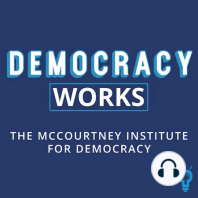35 min listen
Viktor Orbán’s “velvet repression” in Hungary
FromDemocracy Works
ratings:
Length:
42 minutes
Released:
Feb 18, 2019
Format:
Podcast episode
Description
This episode begins a four-part series examining the state of democracy around the world. First up is Hungary, a country that’s often referred to in a group of countries in central and Eastern Europe that are seeing authoritarian leaders rise to power. You might have heard of Viktor Orbán or know that the country is in some way associated with George Soros, but beyond that, it’s not a place many of us spend a lot of time thinking about.
We could not have found a better guest to help us make sense of what’s happening there. John Shattuck is the former President and Rector of Central European University, which Hungary’s Prime Minister recently forced out of the country. He is currently Professor of Practice in Diplomacy at the Fletcher School of Law and Diplomacy at Tufts University and a member of the Council on Foreign Relations.
In this episode, John discusses Viktor Orbán’s rise to power, how he is waging war on democratic institutions, and what people in Hungary are doing to fight back.
Additional Information
How Viktor Orbán degraded Hungary’s weak democracy – John’s article in The Conversation
Discussion/Reflection Questions
What impact has Viktor Orbán has on democracy Hungary?
Is there anything that the rest of the world can do to constrain Orbán’s actions?
What does the future of democracy in Hungary looks like?
Do you notice any similarities between democratic erosion in Hungary and other countries?
Interview Highlights
[6:18] Can you start off by telling us a little bit about Hungary?
Hungary is a small country of about 9 million people in the middle of Europe. It’s been for centuries kind of prize for Invaders; Mongols, Turks, Russians, Germans, Habsburgs and the Soviets. It was a strong economy during the Communist period for 40 years. It had a communist government dominated by the Soviet Union and was a member of the Warsaw Pact. It has almost no history of democracy. There have been many people coming in from outside who are mixed with Hungarians, but it’s also fairly monochromatic homogeneous that language of Hungarian is extremely difficult, spoken pretty much only by Hungarians, and are very few people outside of the country who speak it. In 1989, it emerged from the Soviet era the Communist era and became at least initially a democracy and a market economy. And it was performing quite well in the early days of the post-cold war within 15 years that had joined NATO and also became a member of the European Union.
[10:42] Who is Viktor Orbán?
Viktor Orbán is a Hungarian politician and was Hungary’s Prime Minister from 1998 to 2002. He did not have a very successful term as prime minister, he was fairly unpopular. He was a moderate at that point and when he was defeated at the polls in 2002, he moved sharply to the right because he began to realize that he had an opportunity to appeal to Hungarian nationalism and thereby increases popularity because the party of the right was rising in Hungary. He turned a country that had the beginnings of the democracy and was doing reasonably well democratically into an authoritarian state by using the levers of democracy, the institutions of democracy, by basically taking over the country and taking over its institutions taking control of the courts, the media, civil society, the legislature, and eliminating checks and balances.
[13:12] What were some of the tactics that Orbán used to can gain power or to assemble the power that he has now?
One big factor was the financial crisis of 2009, which hit Hungary harder than almost any other country in Eastern Europe. Other major factor was that after all, Hungary had no previous real experience with democracy. Another factor was the what the isolationist victim mentality aspect of Hungarian culture and society that has been present throughout the country’s history.
[15:55] Was there an element of nostalgia in Orbán tactics?
There was certainly an element of that. Hungary after World War I had been divided up, so many Hungarians
Released:
Feb 18, 2019
Format:
Podcast episode
Titles in the series (100)
Middle America, Part 2: Grassroots organizing and rebooting democracy: Last week, we heard from Salena Zito about the segments of middle America who supported Donald Trump after voting for Barack Obama. This week, we talk with another Pittsburgh resident, Lara Putnam, about a different version of Middle America — the college-educated, middle-aged suburban women who have dusted off the organizing skills honed through decades … Continue reading Middle America, Part 2: Grassroots organizing and rebooting democracy → by Democracy Works
